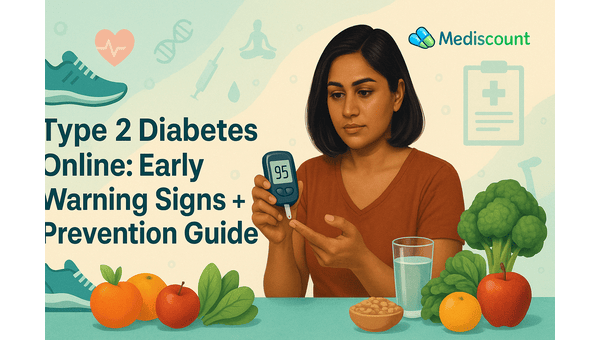A Holistic Approach to Weight Management: Lifestyle First, Medicines as Support
Oct 15, 2025
A Holistic Approach to Weight Management: Lifestyle First, Medicines as Support
Being overweight or obese is a global health problem that raises the risk of diabetes, heart disease, fatty liver, orthopedic problems, and many other health problems. Managing your weight well isn't only about how you look; it's also about your overall health, how long you live, and how good your life is.
As rates of obesity and metabolic disease rise in India, both patients and doctors are becoming more interested in combining lifestyle changes with safe, evidence-based medications. This page talks about the rules for managing weight and discusses the medications that are currently utilized, along with their pros and cons.
1. Make sure your goals are reasonable and specific to you.
A 5–10% drop in baseline body weight over 6–12 months is seen as a clinically significant goal for lowering disease risk in many guidelines.
Some people (especially those on medication) may be able to set more aggressive targets (such 15–20 %), but these should be balanced with safety and long-term success.
2. Food and nutrition
A calorie deficit is still the most important thing: for most people, cutting back on 300–500 kcal/day (or more) is a good place to start.
Eat a lot of nutritious foods that are high in nutrients, like fruits, vegetables, whole grains, legumes, lean protein, and healthy fats.
Cut back on trans fats, fizzy drinks, refined sweets, and ultra-processed foods.
Mindful eating is eating slowly, not letting anything else get in the way, and paying attention to your body's signals that you're full.
3. Exercise and resistance training
As a starting point, try to get at least 150 minutes of moderate-intensity aerobic activity each week (such brisk walking or biking).
To keep or grow lean muscle mass, which helps your basal metabolism, do strength or resistance training 2–3 times a week.
Do more things that don't involve exercise, including standing, walking more, and sitting less. This can have a big effect on how much energy you use each day.
4. Change in behavior, monitoring, and help
Write down everything you eat and do every day, either on paper or on an app.
Keep track of your waist size and weigh yourself (for example, once a week).
Setting goals, overcoming problems, preventing relapses, getting social support, and motivational interviewing are all examples of behavioral methods.
If you can, get a team of professionals from different fields (dietitian, physiotherapist, psychologist, doctor).
5. Treat comorbidities and look into the causes
Check for and treat diabetes, thyroid problems, sleep apnea, depression, medications that make you gain weight, hormonal problems, and so on.
If your BMI and risk factors are right, bariatric surgery may be the best choice for certain people.
The Role of Drugs in Managing Weight
Medicines should be seen as additions to lifestyle therapy, not replacements. They are especially thought of when:
A patient does not lose a specified minimal weight (e.g., < 5%) after 3–6 months of optimal lifestyle modification.
The patient has obesity (or being overweight with other health problems) and is at a higher risk.
The patient and doctor agree on long-term treatment, with regular check-ups.
Important safety and warning notes:
Medical supervision and a prescription: A doctor, preferably one who specializes in endocrinology or obesity, should watch over the use.
Duration and quitting: Many medications need to be taken for a long time; discontinuing typically causes weight gain.
Contraindications: Numerous drugs are prohibited or utilized with caution during pregnancy, specific gastrointestinal disorders, a history of pancreatitis, the risk of medullary thyroid cancer, renal or hepatic problems, etc.
Cost and access: Semaglutide and tirzepatide are two advanced drugs that can be quite expensive and hard to find in many parts of India.
Regulation and risk of misuse: People are worried about using weight-loss medicines without a prescription as a "quick fix." Without proper supervision, the medical community in India has warned against the misuse of popular GLP-1 medications like Wegovy, Ozempic, and Mounjaro.
Complementary use: Medication won't work unless you also follow lifestyle changes.
What the Evidence Says About Medicines to Help You Lose Weight
Slimtop 120 Capsules is a long-standing anti-obesity medicine in India that lowers the amount of fat that is absorbed from food. Even while it doesn't help you lose a lot of weight, it can still be useful if you follow a low-fat diet and keep an eye on your weight.
More contemporary "incretin-based" treatments, such as liraglutide and semaglutide, have demonstrated superior efficacy in clinical trials. In particular, several people lost weight and kept it off with weekly doses of semaglutide 2.4 mg, which was up to about 15%.
Tirzepatide, a novel dual agonist that works on both GIP and GLP-1, is becoming one of the most powerful choices. India has approved Mounjaro for diabetes, and Zepbound is still being looked at to see if it might help people lose weight.
But these kinds of drugs need cautious dose increases and side effect monitoring. They are not magic bullets, though; they need to be used with adjustments to food, activity, and behavior in order to have lasting effects. Stopping often makes people acquire weight again.
Last Thoughts and Things to Keep in Mind
Individualization is essential; there is no universal solution. The patient's BMI, comorbidities, preferences, economic limits, accessibility, and risk profile should all be taken into account when choosing a therapy.
Monitoring and safety: It's important to have regular check-ups, such as for liver function, pancreatic enzymes, renal parameters, gallbladder, thyroid, and mood.
Stay away from supplements that haven't been tested: Many "slimming pills" that you can buy without a prescription are not safe or effective.
Long-term mindset: It's sometimes simpler to lose weight than to keep it off; preventing relapses is really important.
Be honest when you talk about medicines: they are not "miracle cures." They need to be part of a plan that is well-organized and watched by a doctor.
Blogs
Recent Post

Mediscount's Guide to Better Digestion Online for Gut Health

Type 2 Diabetes Online: Early Warning Signs + Prevention Guide

High Blood Pressure – How to Lower It Naturally | Mediscount

How to Lose Weight Safely and Naturally: A Complete Guide by Mediscount

Top 10 Pain Relief Gels for Instant Relief from Muscle and Joint Pain

Top 10 Benefits of Creatine Monohydrate for Fitness and Brain Health

The Right Way to Take Creatine: Loading, Maintenance & Daily Usage Explained

Creatine Monohydrate: The Ultimate Workout Supplement for Strength and Performance

Power of Nature: A Complete Herbal Hair Oil Blend for Stronger, Healthier Hair

Daily Multivitamins, Multiminerals, and Antioxidants: The Foundation of Everyday Wellness


